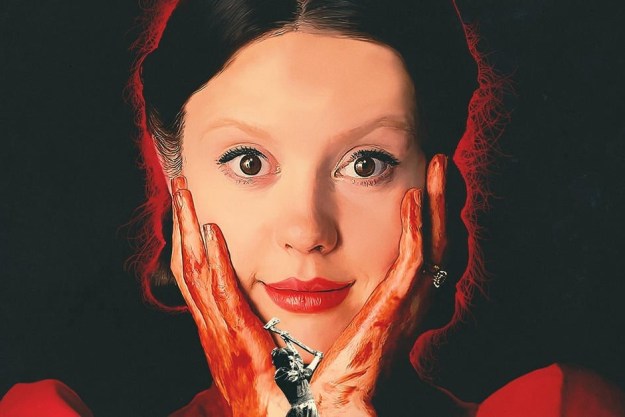With its lush sets and perpetually probing camera, Decision to Leave looks and moves like any other Park Chan-wook film, but it reverberates with the same untempered passion present in Golden Age noirs like In a Lonely Place and Double Indemnity. Unlike those two films, though, which center their stories around a hot-tempered screenwriter and naïve insurance salesman, respectively, Decision to Leave follows another common noir archetype: the lovelorn detective (played here by Park Hae-il).
In the film’s opening moments, Hae-jun, the detective in question, lands a case involving the mysterious death of a recreational rock climber. The case, in typical noir fashion, leads to Hae-jun crossing paths with Seo-rae (a spellbinding Tang Wei), his victim’s gorgeous but eccentric widow. Perturbed by how disinterested she is in unpacking her abusive husband’s death, Hae-jun begins to tail and spy on Seo-rae, unaware that doing so will only further intensify his attraction to her. As far as noir plots go, this is about as familiar as it gets. With its nods to Hitchcock and lightly self-aware attitude, Decision to Leave makes it clear that it doesn’t mind treading the same narrative terrain as so many of the noir classics that have come before it, either.
But if Decision to Leave lacks the same narrative invention as, say, The Handmaiden or Oldboy, it makes up for it with its grand sense of romance and acute understanding of love’s disorienting effects. The film is, in many ways, a natural fit for a director like Park, whose attention to detail and obsession with self-destruction, makes him uniquely well-equipped to handle Decision to Leave’s noir love story. At least, it’s hard to think of another director who would have thought to stage an interrogation scene as an informal dinner date.

Before it gets to the romantic, swooning rhythm of its second and third acts, Decision to Leave begins on a frenetic, purposefully chaotic note. Throughout its first 20 minutes, the film zips and zags through the necessary exposition of its plot, committing to a rapid pace and choppy editorial style that miraculously manages to keep you on your back foot without unnecessarily obfuscating the details of Hae-jun’s case. Information, nonetheless, comes so rapidly and quickly that it can, at times, be difficult to keep track of everything that’s happening on-screen.
Once Tang Wei’s Seo-rae becomes the focus of Hae-jun’s attention, though, the purpose of Decision to Leave’s initially chaotic rhythm becomes clear. The more that Park Hae-il’s sleep-deprived detective becomes consumed with the death of Seo-rae’s husband, the narrower his — and the film’s — focus becomes. Consequently, by the time he’s begun to literally imagine himself in Seo-rae’s apartment during his quiet, lonely stakeouts, we’ve already begun to understand that the frantic, practically slapstick style of Decision to Leave’s first act is nothing more than a reflection of its lead detective’s obsessive, endlessly inquisitive mind.
Ultimately, it’s Seo-rae that brings a sense of calm to Hae-jun’s life and, therefore, the film that has been built around him. There are no moments in Decision to Leave that are as still or quiet as when Seo-rae gently walks Hae-jun through the stages of falling asleep or kisses him on the darkened slopes of a snowy mountain. Her ability to bring Hae-jun’s overwhelming life to a necessary halt makes the power of their bond surprisingly palpably, and it helps the film itself build an unconscious but intense emotional investment in their relationship, which it then weaponizes to devastating effect in its final third.

In Decision to Leave, Park also leaves the early 20th-century setting of The Handmaiden behind in favor of making a strikingly contemporary noir. Here, Seo-rae and Hae-jun not only bond over sushi dinners and conversations by the sea, but through their awkward yet endearing interactions with modern technology. Seo-rae, who is a Chinese immigrant, frequently uses her phone’s translator app to speak Korean for her. Hae-jun, meanwhile, records his stakeout notes as voice memos stored on his Apple Watch, a fact which only opens another door for him and Seo-rae to further indulge in their observations of each other.
Through their respective voice memos and phone translations, director Park both highlights the moments of miscommunication that sit at the very foundation of Hae-jun and Seo-rae’s relationship and uses them to bring the two closer together. As is the case in every detective-suspect relationship, it’s less the desire to understand each other and more the knowledge that they never truly will that draws Hae-jun and Seo-rae together. The moments when they share AirPods to listen to Hae-jun’s stakeout observations or stare into each other’s eyes while a robotic voice translates their words for them, therefore, become Decision to Leave’s most intimate and sensual. They are the instances, at least, in which Hae-jun and Seo-rae’s romantic desires are laid utterly bare.
As Seo-rae, Tang Wei also gives one of the year’s best performances, bringing an open-hearted vulnerability and strangely childlike sense of curiosity to Decision to Leave’s central murder suspect. The sense of freedom that Seo-rae feels now that her abusive husband is dead is made evident with every playful eye roll and endearingly nervous fidget that Wei gives. When Decision to Leave eventually turns her relationship with Hae-jun upside down, Wei’s commanding presence is also powerful enough to make you reconsider which of the film’s two leads was actually the observer all along.

Decision to Leave’s preoccupation with the nature of observation, especially when it comes to love, is ultimately what allows it to blend cinema’s romance and detective genres together so seamlessly. The film’s script, which was co-written by Park and Jeong Seo-kyeong, understands that many of the questions a detective is used to asking their suspect can, in certain instances, be strikingly similar to those that one lover might ask another. In the case of Decision to Leave, the questions that Hae-jun asks Seo-rae quickly become less rooted in his murder case and more in the uncertain nature of their powerful affair.
The film’s third act sees Hae-jun permanently relocate to the small village of Ipo only to eventually discover that Seo-rae has followed him there. During their reunion in an Ipo fish market, Seo-rae tells Hae-jun’s wife (Lee Jung-hyun) that she came to the village for the weather. Hae-jun’s wife responds by noting that “no one comes to Ipo for the fog. They leave because of it.” Later, after another crime brings Hae-jun and Seo-rae together, the former follows the latter out to the edge of a rocky cliff only to furiously ask, “Is this why you came to Ipo?” Given the nature of the film’s third-act crime, it’s a valid question. But, like so many of the questions that are hurled in Decision to Leave, the answer Hae-jun seeks has little to do with what he’s asked.
It’s the kind of indirect question that one only asks when they are so in love that they’re afraid to verbalize their actual concerns. A detective should, arguably, be above such issues, but love, like fog, has a way of descending so deceptively slowly that you don’t realize you’re lost in it until it’s already surrounded you. The magic of Decision to Leave is in how it replicates that experience by so thoroughly entertaining and disorienting you that you don’t realize how invested you’ve become in its twisted love story until you find yourself lost in the haze of its achingly romantic final act.
Whether or not that’s the kind of experience fans of Park Chan-wook’s work will go into Decision to Leave expecting is ultimately of little consequence. After all, Hae-jun and Seo-rae may not have initially sought each other out for love, but no one comes to Ipo for the fog.
Decision to Leave hits theaters in the U.S. on Friday, October 14.
Editors' Recommendations
- Leave the World Behind’s ending, explained
- Amsterdam review: An exhausting, overlong conspiracy thriller
- Vesper review: an imaginative sci-fi adventure
- God’s Creatures review: an overly restrained Irish drama
- Blonde review: a striking and tough Marilyn Monroe biopic




